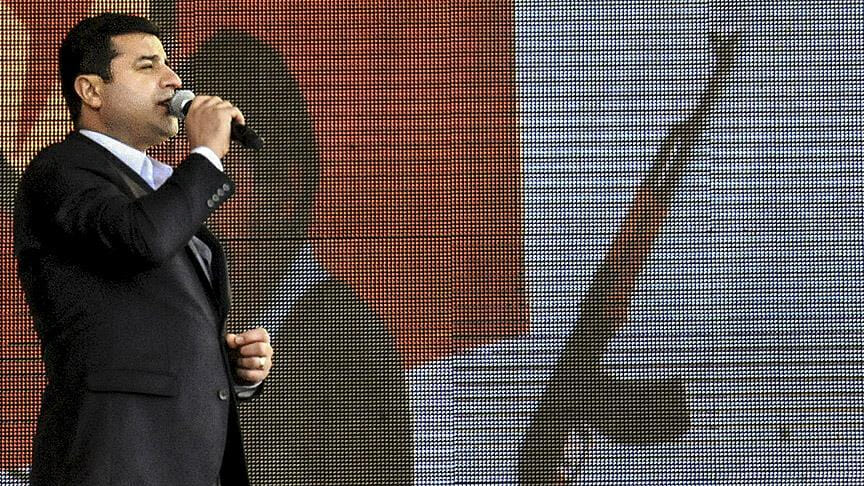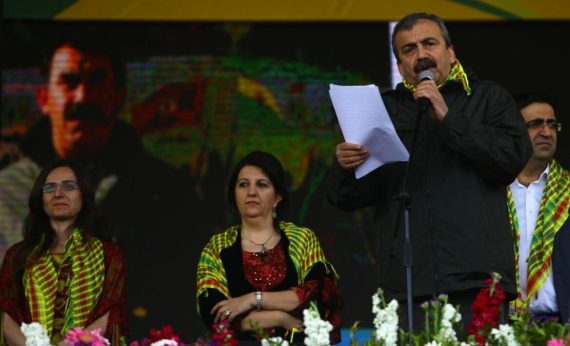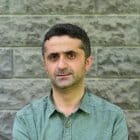On July 22, 2015, the PKK terrorist organization shot dead two policemen in the Ceylanpınar district of Şanlıurfa, marking the end of the so-called “reconciliation process,” a political initiative Turkish authorities had developed to establish a permanent peace in the region. Since then, hundreds of civilians and security officers have fallen martyr in a new wave of bloody PKK terrorist attacks.
Recommended
A New Concept for Counter Terrorism
Turkey has taken conclusive steps to overcome the security concerns created by the PKK. One of these steps, following the words of President Erdogan, was to initiate a constant fight against the terrorist organization. Hundreds of PKK militants have been neutralized with this strategy. The government took control of the transit routes used by the PKK in the mountainous areas. It also largely eliminated the social pressure and the oppression of the PKK’s urban structures in the cities. The second strategic step taken in the struggle against the PKK was to limit its social and political activities. Several media organs and associations that the PKK used as its propaganda machine were closed to reduce its public visibility and to limit its provocations. It was within the same strategic framework that some of the deputies and mayors of the People’s Democratic Party (HDP) were taken into custody. As in the case of Selahattin Demirtaş, the co-leader of the HDP, many of these deputies and mayors were charged with crimes of “establishing an organization to commit crime,” “being a member of a terrorist organization,” and “being a member of an armed terrorist organization.”
Social Anger towards the HDP
In two elections held in 2015, the HDP gained momentum in the east and southeast. The party had significant success at the end of the Turkish general elections on June 7, 2015 and entered the Grand National Assembly with 80 deputies. Although its power partially shrunk, the HDP became the third largest party in the National Assembly with 59 deputies when the results of the compulsory early elections held on November 1, 2015 were announced.
It is appropriate to use the term “power poisoning” to explain what happened after the election. The HDP had become radicalized, hardened, and began to have a similar discourse and policy with the PKK. The statement of Figen Yüksekdağ, the co-leader of the party, was a clear challenge: “We lie our back on the PYD [the Democratic Union Party] and the YPG [the People’s Protection Units].” With the call of Bese Hozat, the co-chair of the Kurdistan Communities Union (KCK), the PKK had initiated the so-called “Revolutionary People’s War” in the months to follow. The PKK militants and its sympathizers paralyzed the daily life of the Kurds when they brought guns to the cities and dug trenches in the streets.
Dozens of people, including children, elderly, and women were killed after the PKK’s DEASH-style car bomb attacks, which aimed to hit the main cities of the country such as the capital Ankara and Istanbul. The HDP, however, has never shown the expected attitude towards the PKK-initiated violence. The Kurds’ expectation from the HDP was to have a high-level political discourse, which would counterbalance the PKK’s terrorist activities. They were greatly disappointed. Selahattin Demirtaş and other deputies chose to remain silent against the PKK domination that began on the evening of the 7 June, 2015 elections. The HDP thus suffered a great loss of prestige in society.
Voices from the streets
It is important to note that the streets in Turkey’s southeast remained calm in the wake of the steps taken by the Turkish authorities to counter terrorism. I had the opportunity to witness the strong roots of this discreet approach during my recent visit to Siirt and Batman. My interactions with the local population of these cities helped me to understand the discreet attitude of the street at the following four junctures:
When the HDP reached its peak
One should carefully read the reaction of the Kurdish population living in the region to the imprisonment of the HDP co-chairs, some deputies, and mayors, as well as the appointment of custodians to the local municipalities. Regardless of whether it really happened or not, an anecdote that I heard in Siirt demonstrates that the majority of the local population was alienated from the HDP’s politics and politicians. The anecdote tells us that an HDP mayor who was going to be taken into custody in a few minutes looks at the entrance gate from the window of his office and states that “if we had won the hearts of people, there would be tens and thousands at our door, but now there are not even a handful men in front of the door to stop the police officers from entering the building.” He then regretfully said to those around him: “there is nothing to do.”
People tell each other, in the form of urban legends, what some of the custodians who are appointed to the municipalities achieved in just 2-3 months compared with what the DBP municipalities have done in 4-5 years.
Although dozens of mayors have been taken into custody from the Democratic Regions Party (DBP), the HDP’s fraternal party in the region, the locals did not show any reaction. The reason behind the lack of local support for the DBP is the fact that the DBP municipalities have spent their time and energy on PKK propaganda, instead of serving the public. People tell each other, in the form of urban legends, what some of the custodians who are appointed to the municipalities achieved in just 2-3 months compared with what the DBP municipalities have done in 4-5 years.
They also talk about certain groups, which the municipalities have enriched by transferring resources and awarding them the contracts. It seems that there were three interrelated factors at work when it comes to the alienation of the Kurdish population from the HDP and its associates: the HDP had a discriminating attitude in its relations with the society. It transferred the economic resources to certain interest groups, and moved closer to the PKK at the height of its political power. The prevailing public opinion among the Kurds is that if the HDP had moved in an opposite direction and had not received this many seats in the parliament, the situation would be different. They, on the other hand, still consider their votes for the HDP as a positive development since it helped them understand the real intentions of the party and witness how it suffered from “power poisoning.”
The “I voted for peace” discourse
“I voted for peace” is one of the prevailing discourses among the locals in the region. The discourse, often expressed by HDP voters, is pronounced as a sign of regret. “I would never vote if I knew the HDP would follow such a way,” one local told me on condition of anonymity. “We voted since we believed that the PKK would withdraw and the civilian politicians would stand against the armed terrorists. The HDP, however, treated us as an apparatus to contribute to the PKK’s war and used our votes as a demonstration of power to increase its political violence. We expected the HDP leaders to strengthen civilian politics and to contribute to an everlasting peace when the party gained 80 deputies in the June 2015 elections.” On the streets of Batman and Siirt, it is almost common to hear “did you also vote for peace?” statement, which the local Kurds use in an ironic way to make fun of how they were deceived before the elections.

“We won’t make you president”
One of the common arguments people used to criticize the HDP politics is the “we won’t make you president” campaign slogan by Demirtaş, targeting President Erdogan. Demirtaş used this slogan for the first time at a party group meeting in the Assembly amid loud applause. This sharp political move increased the reputation of Demirtaş and opened space for him in the Dogan Media group’s coverage of the elections. It is no doubt that the “White Turks” were very much pleased by this statement. The Kurds, who voted for the HDP, however, had a hard time understanding the basis and the aims of this political move at that time. Now, they realize that this political discourse was detrimental to their interests. Most of the Kurds believe that Demirtaş lost great prestige among the locals with this sharp political move since the expression “we won’t make you president” was wrong and had no rational basis for the Kurds. This statement is now one of the main arguments that the Kurds used to direct their criticism towards Demirtaş.
The PKK terrorist attacks damaged the regional economy
The Turkish economy remains robust in the face of global fluctuations, manipulations, and impositions. The economic conditions, however, have put pressure on people. The implications of the economic struggle are more visible in the Kurdish-populated regions of eastern and southeastern Anatolia. The threatening atmosphere that the PKK terrorism created, the efforts of the terrorist organization to prevent state investments, and the tribute that the PKK had asked from private investors, made the conditions harder for the region’s economy.
In Hasankeyf, a shopkeeper who welcomed us in his carpet shop said that the last time he sold a carpet was one and a half years ago. It was an appalling moment.
The security threat posed by the PKK has squeezed the daily life of the Kurds in two ways: dozens of Kurds, including children, lost their lives during the terrorist attacks. The PKK militants looted their houses, burned their businesses and vehicles. The flow of tourists to the region came to a halt. In Hasankeyf, a shopkeeper who welcomed us in his carpet shop said that the last time he sold a carpet was one and a half years ago. It was an appalling moment. Directing his anger to the PKK and HDP, the shopkeeper told us that one and a half years ago, Hasankeyf was filled with both local and foreign tourists.
There are also other factors that played a role in the collapse of the HDP’s politics: The PKK’s killings on June 6-8, 2014 and the devastation of the trench and barricade warfare that the PKK had launched in southeast Turkey after the June 7, 2015 elections. The terrifying memories of these events are still alive. People tell each other the stories of how the PKK terrorists forced old men to dig trenches in the streets and desperate women to leave their houses when they learned that a tunnel would go through their bedrooms.
Perhaps many of the Kurds have not yet spoken aloud, but the clear majority has deeply buried the PKK in the very trenches that the terrorist organization had dug in their inner worlds. Even in the regions where the HDP has received close to 100 percent of the vote, the Kurds have not abided by the PKK’s calls for street rallies or boycotts. The reason behind this is the fact that the Kurds condemned “trench politics” and denounced it as tyrannical.





